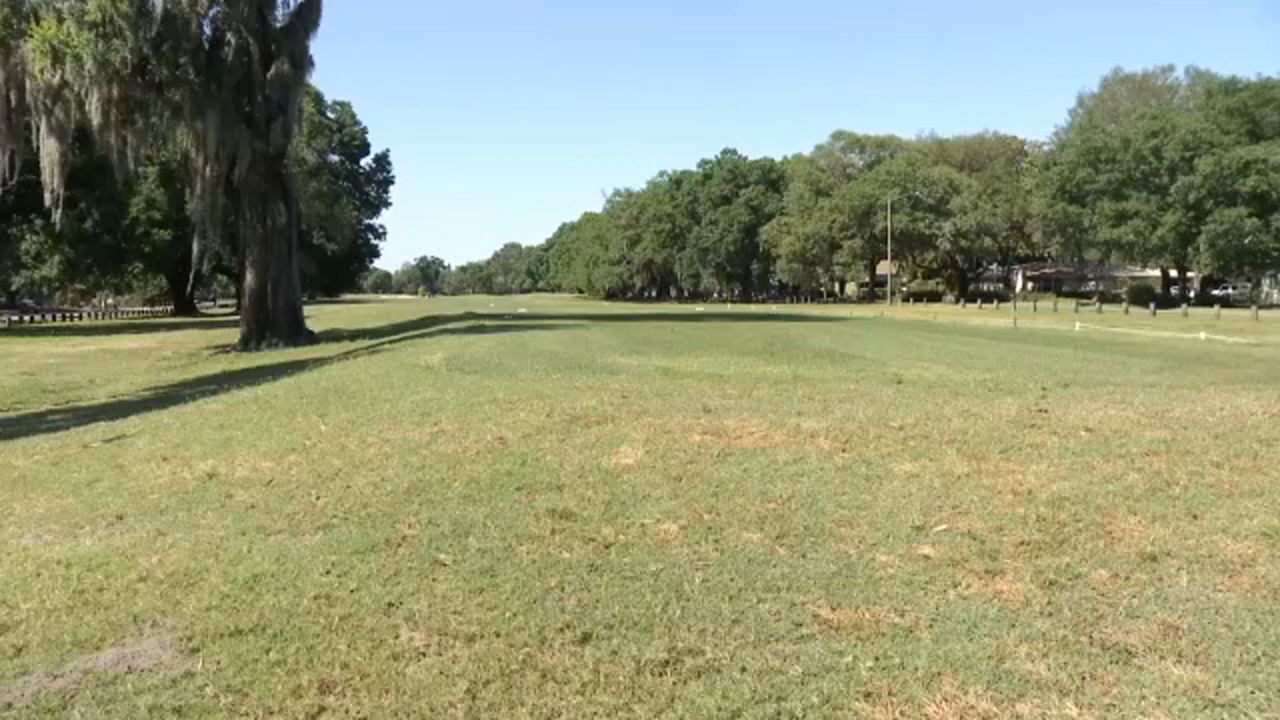Saying that once again they are contending with a nematode infestation at Babe Zaharias Golf Course, the Tampa Sports Authority (TSA) is poised next week to use the controversial chemical fumigant known as Curfew on the North Tampa golf course, and that has a few local residents in the Forest Hills neighborhood very concerned.
What You Need To Know
- Tampa Sports Authority began using Curfew on the three-city owned golf courses that it manages back in 2017, and again last year
- Nearby residents cite "drift" of the chemical; one father says it made his 12-year-old daughter ill
- BELOW: Tampa Sports Authority's statement on the issue
- More Hillsborough County headlines
The agency has employed Curfew several times over the past five years on all three of the city’s owned golf courses, and that has sparked opposition from some residents in Forest Hills, home to Babe Zaharias.
“This product was never intended to be used in this kind of a setting. It drifts. And you can’t control the drift,” says Robert Lawson, whose backyard sits astride the third fairway of the course.
“It’s a probable carcinogen,” he continues. “It’s been banned in Europe for safety reasons. Health authorities say that one exposure to this can cause permanent damage. And (the Dept. of) Health & Human Services says you should avoid this while it’s being used. It off-gases for three days, and they leave the golfers back on the course the next morning, less than 24 hours.”
Forest Hills resident Steve Story’s backyard also is exposed to the golf course. A resident since 1985, he says he can remember when Curfew was used in 2006 as his 12-year-old daughter wandered into his backyard.
“She became ill and was vomiting and had flu like-symptoms, which are the same symptoms of Curfew and she was ill for three days,” he says, adding that she ultimately recovered.
Curfew’s main component is called 1,3 Dichloropropene, which the Environmental Protection Agency (EPA) has classified it as a Group B2, probable human carcinogen.

In a letter sent out to the residents in Forest Hills recently, Kennie Sims, VP of Golf Operations for the TSA, writes that the agency is “experiencing a similar nematode infestation this year at Babe Zaharias Golf Course. Since 2016, we have used numerous methods to treat for nematodes with minimal success. As a result, ABM Golf Services, our maintenance contractor, recommends Southern Soils Turf Solutions – Curfew fumigant as the most effective option to treat for the infestation of nematodes.”
Plant-parasitic nematodes have been described as roundworms that are more common and more severe in Florida than other states and can cause significant damage to turfgrass primarily used on golf courses.
After Curfew was used in 2006, some neighborhood activists fought back against its use. But the Tampa Sports Authority began using it again on the three-city owned golf courses that it manages back in 2017, and again last year.
In a statement sent to Spectrum Bay News 9, the Tampa Sports Authority says that “Curfew is a registered product approved for use throughout the state of Florida by the Florida Department of Agriculture and Consumers Services (FDACS) and the United States Environmental Protection Agency (EPA). FDACS is the agency responsible for approving pesticides for use in the state of Florida. Curfew® is approved for use on Florida golf courses.”
(See entire statement below).
Shortly after the TSA administered Curfew on all three city golf courses last June, (Rogers Park and Rocky Point are the two other city-owned courses), the Environmental Protection Commission of Hillsborough County conducted air sampling to measure the ambient air concentration of Curfew, and reported that the level of concentrations that were measured “are not a health concern.”
The fact that the TSA used Curfew less than a year ago is significant, says Nancy Stevens with the Tampa Bay Chapter of the Sierra Club. She notes that using Curfew within a year violates the instructions on Dow AgroScience’s directions for use in the state of Florida, which states that “Make only one application of Curfew per year.”
This is the first time that the local Sierra Club has interjected in the dispute over the TSA using Curfew on the city’s owned golf courses. Stevens says that the group will soon be contacting the Sports Authority to urge them to find another solution to controlling nematodes on the golf course.
The golf course is named after Zaharias, considered one of the greatest athletes of the 20th Century. The Texas native excelled in basketball, baseball and track and field before turning to professional golf and winning 10 LPGA major championships. In 1950, she and her husband purchased what was then called the Forest Hills Golf and Country Club and renamed it the Tampa Golf and Country Club before she passed away in 1956. In 1974 the city of Tampa reopened the golf course and named it in her honor.
Here is the complete statement from the Tampa Sports Authority about its planned use of Curfew next week:
As with all past applications, only a limited part of the course is being treated, not the entire golf course. Curfew is a restricted use pesticide and is only applied by trained, licensed professional applicators using specialized equipment. Curfew is a registered product approved for use throughout the State of Florida by the Florida Department of Agriculture and Consumer Services (FDACS) and the United States Environmental Protection Agency (EPA). FDACS is the agency responsible for approving pesticides for use in the State of Florida. Curfew® is approved for use on Florida golf courses.
In 2017, 2019 and 2020, the EPC of Hillsborough County conducted air quality tests for 24 hours after the application with readings well below the acceptable level. The EPC will also conduct those air quality tests this year.



